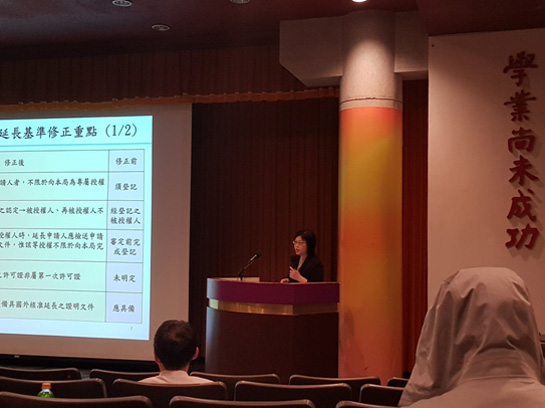|

A Taiwan Intellectual Property Office official explains the amendments to the patent extension examination standards;
Photo by Conor Stuart
Although Taiwan has put the implementation of its patent linkage system on hold for the time being, the Taiwan Intellectual Property Office (TIPO) has made some changes to the examination standards for patent extensions to make up for delays in regulatory approval for new pharmaceuticals, making it easier for exclusive licensees to get extensions without having to register their licensee status.
To make up for the lengthy delay that many pharmaceutical companies face in getting regulatory approval for the subject matter of their patents, TIPO has long offered patentees the opportunity to extend the life of their patent for the period from grant until regulatory approval is granted, to an upper limit of five years.
TIPO’s revamped examination guidelines for extension approval came into effect on April 1, 2018. The big changes are as follows:
1. Patentee Licensees No Longer Have to Register with TIPO Before Applying for an Extension
Previously in cases were the patent rights holder has exclusively licensed the patent for implementation by another party, the party to extend the patent would have to have registered as the exclusive patent licensee with the Taiwan Intellectual Property Office before being allowed to apply for the extension. When an exclusive patent licensee is the applicant for a patent extension, they no longer have to be registered as such with the Taiwan Intellectual Property Office.
Although after the amendment, the exclusive patentee no longer has to be registered as such with TIPO, they must include proof of a licensing agreement with their application for patent extension.
2. First Permitted License Holder No Longer Has to be Registered as a Patent Licensee with TIPO
If the first to be approved is a patent licensee or a secondary patent licensee they no longer have to be registered as such with the Taiwan Intellectual Property Office to apply for a patent extension.
3. Evidence of Licensing Deal In Effect Before Date of Application Necessary in Place of Registration with TIPO
When the first permitted to sell the pharmaceutical is a patent licensee, they should provide evidence of the license deal being in effect along with their application when they are applying for a patent extension, and they no longer have to be registered as a licensee before application.
Previously, if the holder of the first permitted license was not the patent holder or a patent licensee registered with TIPO, they had to request that the patent holder respond or provide additional materials on their behalf. If no response was received and no additional materials provided, then the patent term could not be extended. However, after the amendment, the holder of the first permitted license can be the patent holder or an exclusive or non-exclusive patent licensee. If the holder of the first permitted license is not the patent holder, the applicant must provide evidence that they belong to the same corporation or proof of a license agreement completed before the date of application. The application for extension will be rejected if such proof is not provided, or not provided in full.
If the applicant for patent extension is not the holder of the first permitted license, they need to provide evidence of a licensing contract undertaken before the date of application for extension.
If the holder of the first permitted license is a secondary patent licensee of a non-exclusive patent licensee, they also need to include the following documents in any application:
- An account of the licensing agreement between the non-exclusive patent licensee and the secondary patent licensee
- Proof that the non-exclusive patent licensee has the right to issue secondary patent licenses from the rights holder.
4. Pharmaceutical Ingredients and Technical Grade Agrichemical License Clarification
Unprocessed pharmaceutical ingredient licenses and technical grade agrichemical licenses are not part of the first permitted license (clarifying previous ambiguity).
5. No Certificate of Overseas Patent Extension Required When Clinical Trials Took Place Overseas
When applying for a patent extension on the basis of clinical trials overseas, no certificate of approval of patent extension from the relevant overseas jurisdiction is needed, whereas it previously was a requirement.
6. The Active Ingredients Under The First Permitted License Should Correlate To The Active Ingredients Of The Drug Itself
Before the amendment, the active ingredients as listed on the first permitted license and the application were both considered in the issuing of the patent extension. In cases where two licenses were issued consecutively, if the active ingredients were substantially the same (like first permitted licenses for different salts of the same active ingredients), where the application was the same, but where the later license is not a part of the first license, it should not be granted a patent extension.
An active ingredient in a first permitted license is an ingredient in a pharmaceutical product which has a pharmacological effect.
After the amendment, different salts, hydrates and esters of the same active ingredient, with the same application all count as first permitted licenses.
7. Active Ingredient Inclusion vs. Correspondence
The scope of the patented invention which is being extended should include the active ingredients, composition of matter/method that is subject to the first permitted license, whereas before they needed to correspond.
Under the previous rules, the active ingredients listed on the first permitted license or their combination/application had to correspond to patent claims. After the amendment, the active ingredients, their combination or application must be explicitly included in the claims of the patent in question.
If patent holders or patent licensees are granted more than one first permitted license on the same day (i.e. for different dosage amounts) for active ingredients covered by more than one patent, they should choose within one month which one they want to extend the patent of, otherwise the application for extension will be denied.
8. Final Day of Examination for Agrichemical Registrations
The final day of examination for applications relating to agrichemical registrations is the date of issue of the agrichemical license, as opposed to previously when it was the when the license was actually received.
9. One Patent One Extension
A patent term can only be extended once, as stated in Article 53 of the Patent Act, by extension this means that a first permitted license of a drug can only be used once to extend a patent term. Individual claims of a patent cannot be the subject of separate patent extensions. This means that patent applicants need to think about patent extensions at the patent application stage, in regards to whether they should file divisional applications or one single application. Patents can only be extended up to a maximum of five years, regardless of whether the regulatory delay exceeds this period.
10. Start and End Date of Clinical Trials
The starting and ending dates of clinical experiments are based on the dates listed in the International Conference on Harmonization of Technical Requirements of Pharmaceuticals for Human Use (ICH) Report for overseas clinical trials. For domestic clinical trials, the starting date of the experiment is the date that the Ministry of Health and Welfare sends notification of their consent for the clinical trials as the start date, and the date the Ministry sends notification that the report on the experiments is complete as the end date.
Applications for patent extension must be made within three months of the first permitted license being granted.
 |
|
| Author: |
Conor Stuart |
| Current Post: |
Senior Editor, IP Observer |
| Education: |
MA Taiwanese Literature, National Taiwan University
BA Chinese and Spanish, Leeds University, UK |
| Experience: |
Translator/Editor, Want China Times
Editor, Erenlai Magazine |
|
|
|
| Facebook |
|
Follow the IP Observer on our FB Page |
|
|
|
|
|
|

